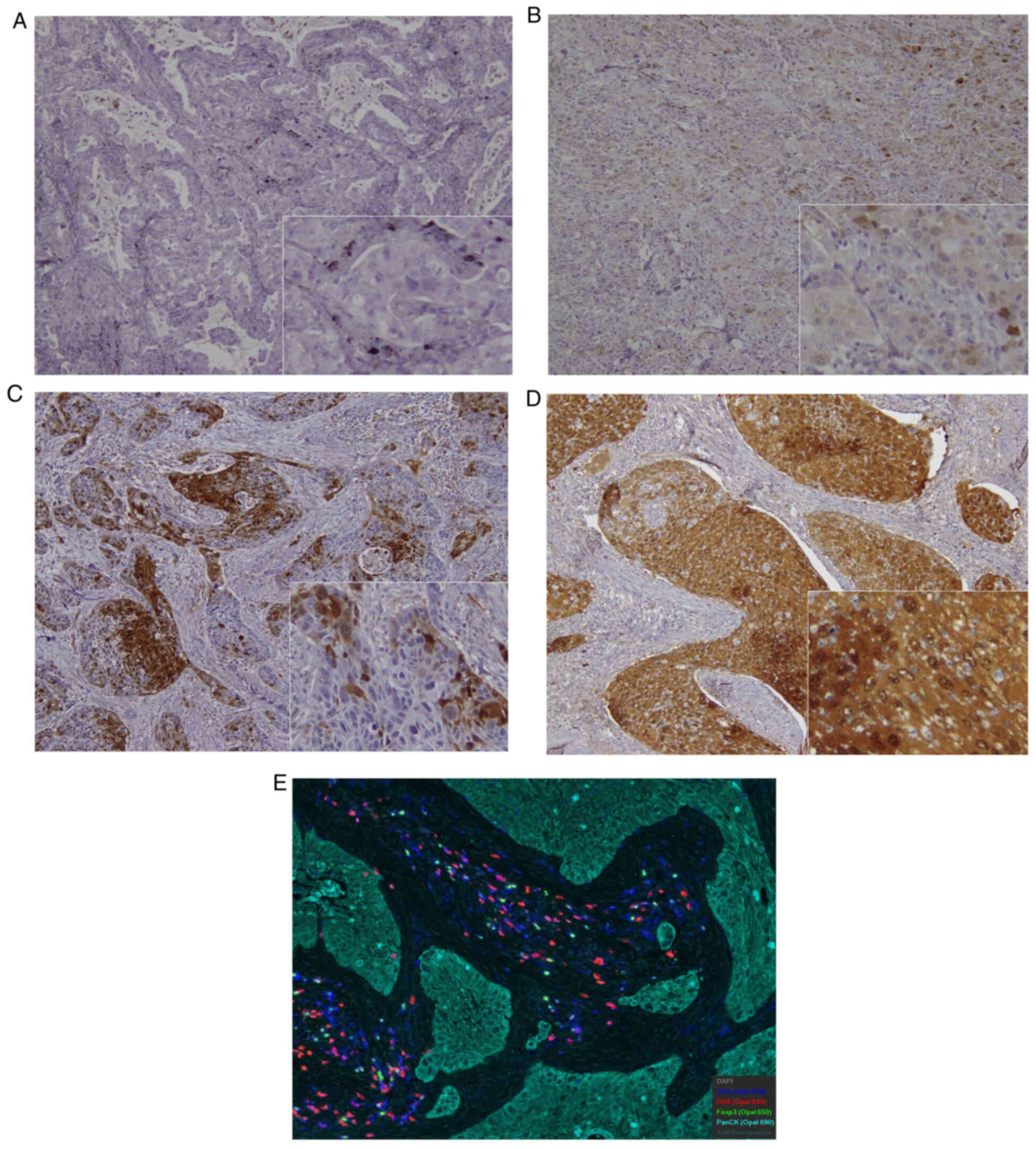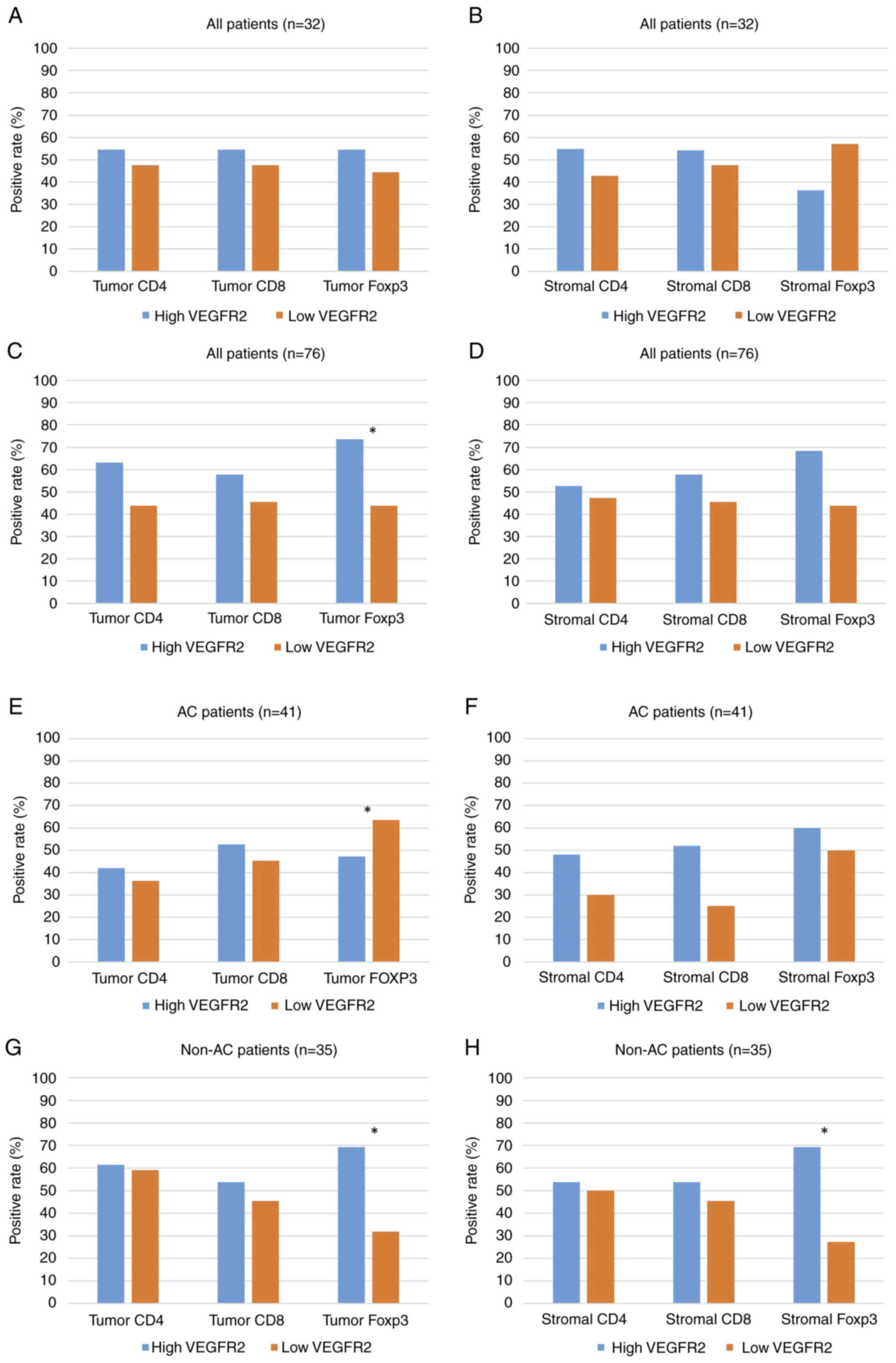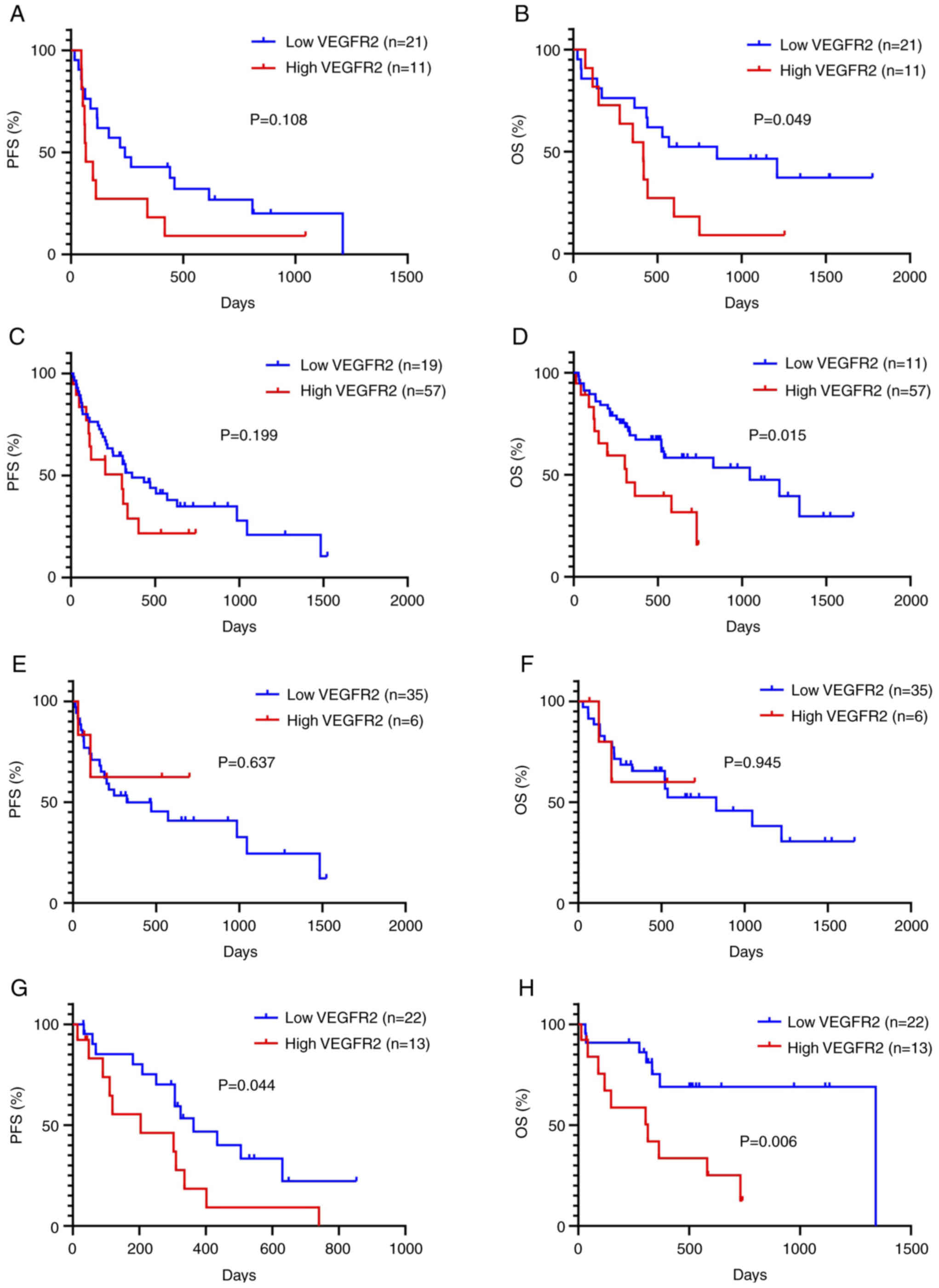|
1
|
Garon EB, Hellmann MD, Rizvi NA, Carcereny
E, Leighl NB, Ahn MJ, Eder JP, Balmanoukian AS, Aggarwal C, Horn L,
et al: Five-year overall survival for patients with advanced
non-small-cell lung cancer treated with pembrolizumab: Results from
the phase I KEYNOTE-001 study. J Clin Oncol. 37:2518–2527. 2019.
View Article : Google Scholar : PubMed/NCBI
|
|
2
|
Ma K, Jin Q, Wang M, Li X and Zhang Y:
Research progress and clinical application of predictive biomarker
for immune checkpoint inhibitors. Expert Rev Mol Diagn. 19:517–529.
2019. View Article : Google Scholar : PubMed/NCBI
|
|
3
|
Song Y, Fu Y, Xie Q, Zhu B, Wang J and
Zhang B: Antiangiogenic agents in combination with immune
checkpoint inhibitors: A promising strategy for cancer treatment.
Front Immunol. 11:19562020. View Article : Google Scholar : PubMed/NCBI
|
|
4
|
Padda SK and Reckamp LK: Combination of
immunotherapy and antiangiogenic therapy in cancer-a rational
approach. J Thorac Oncol. 16:178–182. 2020. View Article : Google Scholar : PubMed/NCBI
|
|
5
|
Finn RS, Qin S, Ikeda M, Galle PR, Ducreux
M, Kim YY, Kudo M, Breder V, Merle P, Kaseb AO, et al: Atezolizumab
plus bevacizumab in unresectable hepatocellular carcinoma. N Engl J
Med. 382:1894–1905. 2020. View Article : Google Scholar : PubMed/NCBI
|
|
6
|
Rini BI, Plimack ER, Stus V, Gafanov R,
Hawkins R, Nosov D, Pouliot F, Alekseev B, Soulières D, Melichar B,
et al: Pembrolizumab plus axitinib versus sunitinib for advanced
renal-cell carcinoma. N Engl J Med. 380:1116–1127. 2019. View Article : Google Scholar : PubMed/NCBI
|
|
7
|
Socinski MA, Jotte RM, Cappuzzo F, Orlandi
F, Stroyakovskiy D, Nogami N, Rodríguez-Abreu D, Moro-Sibilot D,
Thomas CA, Barlesi F, et al: Atezolizumab for first-line treatment
of metastatic nonsquamous NSCLC. N Engl J Med. 378:2288–2301. 2018.
View Article : Google Scholar : PubMed/NCBI
|
|
8
|
Motzer RJ, Penkov K, Haanen J, Rini B,
Albiges L, Campbell MT, Venugopal B, Kollmannsberger C, Negrier S,
Uemura M, et al: Avelumab plus axitinib versus sunitinib for
advanced renal-cell carcinoma. N Engl J Med. 380:1103–1115. 2019.
View Article : Google Scholar : PubMed/NCBI
|
|
9
|
Herbst RS, Arkenau HT, Bendell J,
Arrowsmith E, Wermke M, Soriano A, Penel N, Santana-Davila R,
Bischoff H, Chau I, et al: Phase 1 expansion cohort of ramucirumab
plus pembrolizumab in advanced treatment-naïve NSCLC. J Thorac
Oncol. 16:289–298. 2021. View Article : Google Scholar : PubMed/NCBI
|
|
10
|
Mok TSK, Wu YL, Kudaba I, Kowalski DM, Cho
BC, Turna HZ, Castro G Jr, Srimuninnimit V, Laktionov KK,
Bondarenko I, et al: Pembrolizumab versus chemotherapy for
previously untreated, PD-L1 expressing, locally advanced or
metastatic non-small-cell lung cancer (KEYNOTE-042): A randomized,
open-label, controlled, phase 3 Trial. Lancet. 393:1819–1830. 2019.
View Article : Google Scholar : PubMed/NCBI
|
|
11
|
Garon EB, Ciuleanu TE, Arrieta O, Prabhash
K, Syrigos KN, Goksel T, Park K, Gorbunova V, Kowalyszyn RD, Pikiel
J, et al: Ramucirumab plus docetaxel versus placebo plus docetaxel
for second-line treatment of stage IV non-small-cell lung cancer
after disease progression on platinum-based therapy (REVEL): A
multicenter, double-blind, randomised phase 3 Trial. Lancet.
384:665–673. 2014. View Article : Google Scholar : PubMed/NCBI
|
|
12
|
Bilguun EO, Kaira K, Kawabata-Iwakawa R,
Rokudai S, Shimizu K, Yokobori T, Oyama T, Shirabe K and Nishiyama
M: Distinctive roles of syntaxin binding protein 4 and its action
target, TP63, in lung squamous cell carcinoma: A theranostic study
for the precision medicine. BMC Cancer. 20:9352020. View Article : Google Scholar : PubMed/NCBI
|
|
13
|
Gandhi L, Rodríguez-Abreu D, Gadgeel S,
Esteban E, Felip E, De Angelis F, Domine M, Clingan P, Hochmair MJ,
Powell SF, et al: Pembrolizumab plus chemotherapy in metastatic
non-small-cell lung cancer. N Engl J Med. 378:2078–2092. 2018.
View Article : Google Scholar : PubMed/NCBI
|
|
14
|
Paz-Ares L, Luft A, Vicente D, Tafreshi A,
Gümüş M, Mazières J, Hermes B, Çay Şenler F, Csőszi T, Fülöp A, et
al: Pembrolizumab plus chemotherapy for squamous non-small-cell
lung cancer. N Engl J Med. 379:2040–2051. 2018. View Article : Google Scholar : PubMed/NCBI
|
|
15
|
CTCAEv 4.0, URL. http://ctep.cancer.gov/protocolDevelopment/electronic_applications/ctc.htm#ctc_40
|
|
16
|
Eisenhauer EA, Therasse P, Bogaerts J,
Schwartz LH, Sargent D, Ford R, Dancey J, Arbuck S, Gwyther S,
Mooney M, et al: New response evaluation criteria in solid tumour:
Revised RECIST guideline (version 1.1). Eur J Cancer. 45:228–247.
2009. View Article : Google Scholar : PubMed/NCBI
|
|
17
|
Imai H, Kaira K, Hashimoto K, Nitanda H,
Taguchi R, Yanagihara A, Umesaki T, Yamaguchi O, Mouri A, Kawasaki
T, et al: Tumor immunity is related to 18F-FDG uptake in
thymic epithelial tumor. Cancer Med. 10:6317–6326. 2021. View Article : Google Scholar : PubMed/NCBI
|
|
18
|
Halse H, Colebatch AJ, Petrone P,
Henderson MA, Mills JK, Snow H, Westwood JA, Sandhu S, Raleigh JM,
Behren A, et al: Multiplex immunohistochemistry accurately defines
the immune context of metastatic melanoma. Sci Rep. 8:111582018.
View Article : Google Scholar : PubMed/NCBI
|
|
19
|
Zhu P, Hu C, Hui K and Jiang X: The role
and significance of VEGFR2 regulatory T cells in tumor immunity.
Onco Targets Ther. 10:4315–4319. 2017. View Article : Google Scholar : PubMed/NCBI
|
|
20
|
Suzuki H, Onishi H, Wada J, Yamasaki A,
Tanaka H, Nakano K, Morisaki T and Katano M: VEGFR2 is selectively
expressed by FOXP3high CD4+ Treg. Eur J Immunol. 40:197–203. 2010.
View Article : Google Scholar : PubMed/NCBI
|
|
21
|
Zhang Z, Huang H, Coleman M, Ziemys A,
Gopal P, Kazumi S and Brekken R: VEGFR2 activity on myeloid cells
mediates immune-suppression in the tumor environment. JCI Insight.
6:e1507352021. View Article : Google Scholar : PubMed/NCBI
|
|
22
|
Shibaki R, Murakami S, Shinno Y, Matsumoto
Y, Yoshida T, Goto Y, Kanda S, Horinouchi H, Fujiwara T, Yamamoto
N, et al: Predictive value of serum VEGF levels for elderly
patients or for patients with poor performance status receiving
anti-PD-1 antibody therapy for advanced non-small cell lung cancer.
Cancer Immunol Immunother. 69:1229–1236. 2020. View Article : Google Scholar : PubMed/NCBI
|
|
23
|
Makker V, Rasco D, Vogelzang NJ, Brose MS,
Cohn AL, Mier J, Simone CD, Hyman DM, Stepan DE, Dutcus CE, et al:
Lenvatinib plus pembrolizumab in patients with advanced endometrial
cancer: An interim analysis of a multicenter, open-label,
single-arm, phase 2 trial. Lancet Oncol. 20:711–718. 2019.
View Article : Google Scholar : PubMed/NCBI
|
|
24
|
Herbest RS, Arkenau HT, Santana-Davila R,
Calvo E, Paz-Ares L, Cassier PA, Bendell J, Penel N, Krebs MG,
Martin-Leberal J, et al: Ramucirumab plus pembrolizumab in patients
with previously treated advanced non-small-cell lung cancer,
gastro-oesophageal cancer, or urothelial carcinomas (JVDE): A
multicohort, non-randomised, open-label, phase 1a/b trial. Lancet
Oncol. 20:1109–1123. 2019. View Article : Google Scholar : PubMed/NCBI
|
|
25
|
Arkenau HT, Martin-Liberal J, Calvo E,
Penel N, Krebs MG, Herbst RS, Walgren RA, Widau RC, Mi G, Jin J, et
al: Ramucirumab plus pembrolizumab in patients with previously
treated advanced or metastatic biliary tract cancer: Nonrandomized,
open-label, phase I trial (JVDF). Oncologist. 23:1407–e136. 2018.
View Article : Google Scholar : PubMed/NCBI
|
|
26
|
Reckamp KL, Radman MW, Dragnew KH,
Minichiello K, Villaruz LC, Faller B, Baghdadi TA, Hines S,
Everhart L, Highleyman L, et al: Phase II randomized study of
ramucirumab and pembrolozumab versus standard of care in advanced
non-small-cell lung cancer previously treated with
immunotherapy-Lung-MAP S1800A. J Clin Oncol. 40:2295–2306. 2022.
View Article : Google Scholar : PubMed/NCBI
|
|
27
|
Paz-Ares L, Ciuleanu TE, Cobo M, Schenker
M, Zurawski B, Menezes J, Richardet E, Bennouna J, Felip E,
Juan-Vidal O, et al: First-line nivolumab plus ipilimumab combined
with two cycles of chemotherapy in patients with non-small-cell
lung cancer (CheckMate 9LA): An international, randomised,
open-label, phase 3 trial. Lancet Oncol. 22:198–211. 2021.
View Article : Google Scholar : PubMed/NCBI
|
|
28
|
Paz-Ares LG, Ramalingam SS, Ciuleanu TE,
Lee JS, Urban L, Caro RB, Park K, Sakai H, Ohe Y, Nishio M, et al:
First-line Nivolumab plus Ipilimumab in advanced NSCLC: 4-year
outcomes from the randomized, open-label, phase 3 CheckMate 227
Part 1 Trial. J Thorac Oncol. 17:289–308. 2022. View Article : Google Scholar : PubMed/NCBI
|
|
29
|
Ma X, Riaz N, Samstein RM, Lee M, Makarov
V, Valero C, Chowell D, Kuo F, Hoen D, Fitzgerald CWR, et al:
Functional landscapes of POLE and POLD1 mutations in checkpoint
blockade-dependent antitumor immunity. Nat Genet. 54:996–1012.
2022. View Article : Google Scholar : PubMed/NCBI
|
|
30
|
Sun H, Liu SY, Zhou JY, Xu JT, Zhang HK,
Yan HH, Huan JJ, Dai PP, Xu CR, Su J, et al: Specific TP53 subtype
as biomarker for immune checkpoint inhibitors in lung
adenocarcinoma. EBioMedicine. 60:1029902020. View Article : Google Scholar : PubMed/NCBI
|
|
31
|
West HJ, McCleland M, Cappuzzo F, Reck M,
Mok TS, Jotte RM, Nishio M, Kim E, Morris S, Zou W, et al: Clinical
efficacy of atezolizumab plus bevacizumab and chemotherapy in
KRAS-mutated non-small cell lung cancer with STK11, KEAP1, or TP53
comutations: Subgroup results from the phase III IMpower150 trial.
J Immunother Cancer. 10:e0030272022. View Article : Google Scholar : PubMed/NCBI
|
|
32
|
Skoulidis F, Li BT, Dy GK, Price TJ,
Falchook GS, Wolf J, Italiano A, Schuler M, Borghaei H, Barlesi F,
et al: Sotorasib for Lung Cancers with KRAS p.G12C Mutation.
N Engl J Med. 384:2371–2381. 2021. View Article : Google Scholar : PubMed/NCBI
|
|
33
|
Frost N, Kollmeier J, Vollbrecht C, Grah
C, Matthes B, Pultermann D, von Laffert M, Lüders H, Olive E, Raspe
M, et al: KRASG12C/TP53 co-mutations identify long-term
responders to first line palliative treatment with pembrolizumab
monotherapy in PD-L1 high (≥50%) lung adenocarcinoma. Transl Lung
Cancer Res. 10:737–752. 2021. View Article : Google Scholar : PubMed/NCBI
|
|
34
|
Ohtaki Y, Kaira K, Yajima T, Erkhem-Ochir
B, Kawashima O, Kamiyoshihara M, Igai H, Onozato R, Ibe T, Kosaka
T, et al: Comprehensive expression analysis of
chemosensitivity-related markers in large cell neuroendocrine
carcinoma of the lung. Thorac Cancer. 12:2666–2679. 2021.
View Article : Google Scholar : PubMed/NCBI
|

















